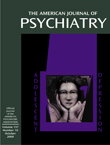Delirium With Autoimmune Thyroiditis Induced by Interferon Alpha
Ms. A, a 23-year-old woman with a 6-month history of INF-α therapy after a right nephrectomy for renal cell carcinoma, had no apparent psychiatric history. Ten days after the cessation of INF-α treatment, with confirmation that there was no recurrence of carcinoma in the abdominal region on magnetic resonance imaging, she developed delirium with a fluctuating level of consciousness and psychomotor excitement and was brought to a psychiatrist by her parents. She was immediately admitted to a psychiatric unit.Although a brain computerized tomography scan did not reveal any signs of metastases, the results of laboratory tests showed abnormal thyroid function: a thyroid-stimulating hormone (TSH) level of 53.97 μU/ml, free triiodothyronine level of 2.24 pg/ml, free thyroxine level of 3.6 pg/ml, a positive microsomal test result of X409600, a positive antithyroid peroxidase antibody test result of 465 U/ml, and a positive antithyroglobulin antibody test result of 3.7 U/ml. There were no abnormal test results for liver and kidney function. Echo examination revealed that the size of Ms. A’s thyroid gland was within normal limits. She had not been diagnosed with thyroid dysfunction before the current admission. Thyroid hormone replacement therapy was initiated on the seventh day of admission. Her TSH level returned to normal in 3 weeks, and her delirium gradually improved with thyroid hormone replacement therapy and without the use of neuroleptics. After recovery from the episode Ms. A could recall nothing from the first 10 days of admission.
References
Information & Authors
Information
Published In
History
Authors
Metrics & Citations
Metrics
Citations
Export Citations
If you have the appropriate software installed, you can download article citation data to the citation manager of your choice. Simply select your manager software from the list below and click Download.
For more information or tips please see 'Downloading to a citation manager' in the Help menu.
View Options
View options
PDF/EPUB
View PDF/EPUBGet Access
Login options
Already a subscriber? Access your subscription through your login credentials or your institution for full access to this article.
Personal login Institutional Login Open Athens loginNot a subscriber?
PsychiatryOnline subscription options offer access to the DSM-5-TR® library, books, journals, CME, and patient resources. This all-in-one virtual library provides psychiatrists and mental health professionals with key resources for diagnosis, treatment, research, and professional development.
Need more help? PsychiatryOnline Customer Service may be reached by emailing [email protected] or by calling 800-368-5777 (in the U.S.) or 703-907-7322 (outside the U.S.).

